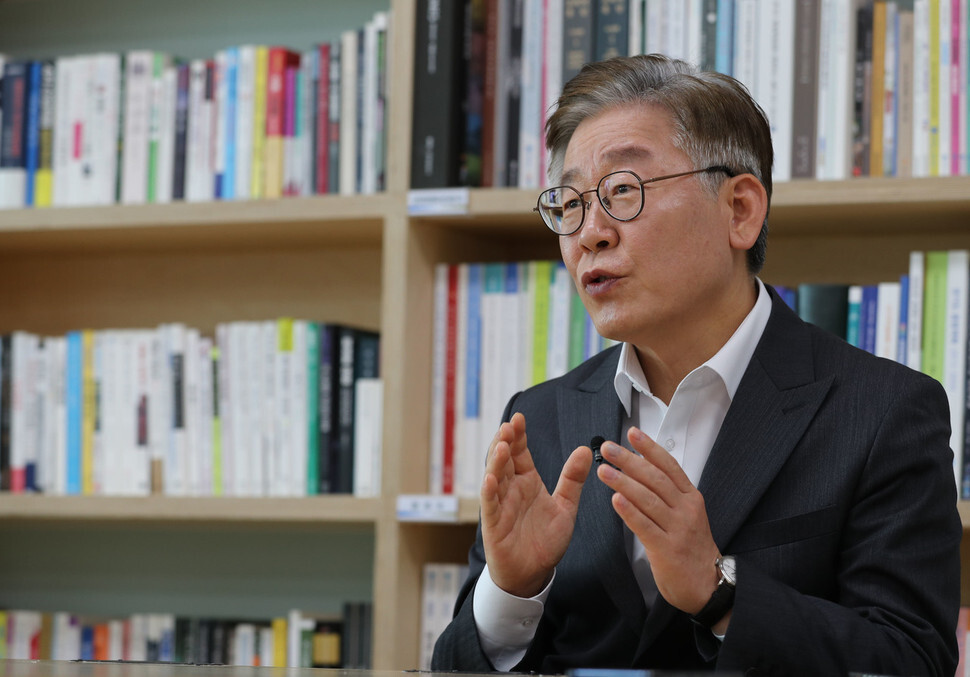hankyoreh
Links to other country sites 다른 나라 사이트 링크
13 out of 43 S. Korean provincial/metropolitan government providing emergency aid
A

mid the mounting damage caused by the coronavirus pandemic, 13 of South Korea’s metropolitan and provincial governments and 43 smaller local governments are providing residents with fiscal aid on their own, separately from the central government’s basic disaster allowance. Local governments are moving quickly to provide assistance, out of concern that this might be their best chance to forestall a painful recovery.
According to data about emergency disaster aid being provided by local governments that the Hankyoreh received from the Ministry of the Interior and Safety (MOIS) on Apr. 22, 13 of 17 provincial and metropolitan governments (including Seoul, Gyeonggi Province, Busan, Daegu, and Gwangju) were accepting applications for emergency disaster aid or already making payments as of Apr. 20. North Chungcheong Province, Incheon, Ulsan, and Sejong City are either working on aid packages or aren’t providing aid.
The method of aid, and the people eligible for it, vary with each local government. Following a decision by the Seoul Metropolitan Council on Mar. 24, Seoul is paying 300,000-500,000 won (US$244-206) to 1,177,000 households, representing all households that fall below the median income. Eligible households must submit their application by May 15.
Daegu and Jeju have also decided to provide assistance to everyone below the median income. Daegu will be providing 459,000 households with 500,000-900,000 won (US$406-732) according to the number of household members, while Jeju is paying 400,000-1,000,000 won (US$325-813) to 170,000 households.
In addition to people below the median income, Gwangju has identified other groups that are eligible for aid. Those working in commission-based jobs — including insurance salespeople, home tutors, academy instructors, and on-call chauffeurs — and those who have lost their job or been put on unpaid leave because of the coronavirus outbreak will be paid up to 1 million won.
On Mar. 27, the provincial legislature of South Chungcheong Province agreed on a more detailed aid package. The province will be paying 1 million won to small business owners with under 300 million won (US$243,987) in sales last year (there are some 100,000 people in the province), provided that their credit card sales have fallen by at least 20% compared to the same period last year. The same amount will be paid to company-hired taxi drivers and city and intercity bus drivers whose income has decreased.
Among the lower tier of local governments (which includes municipalities, counties, and metropolitan districts), 43 governments (as of Apr. 20) have reportedly developed aid packages in addition to what’s being provided by the central government and provincial and metropolitan governments.
Seoul’s Dongjak District has decided to pay 700,000 won (US$569) to 13,022 small businesses with operations in the district and wrapped up the application process on Apr. 21.
Hwaseong, a municipality in Gyeonggi Province, has agreed to pay 200,000 won (US$163) to all its 830,000 citizens and up to 2 million won (US$1,626) to small business owners whose sales have fallen at least 10% relative to the same month last year.
The municipality of Jeonju, in North Jeolla Province, will be paying 500,000 won (US$506) per person to those making below 80% of the median income and to irregular workers and unemployed individuals 15 years old and up whose income has been negatively affected by the coronavirus. Jeonju will be accepting applications for financial aid through Apr. 24.
Applicants need to check eligibility and requirements in respective locations of residenceSince the applications periods and payment methods are different in each region, applicants should be sure to look up the information that’s relevant for their place of residence. Since the central government has announced that local governments will be on the hook for 20-30% of the funding required for the nationwide emergency disaster aid, debate is expected to continue about the government plan, which has yet to be finalized.
By Song Gyung-hwa, staff reporter
Please direct comments or questions to [english@hani.co.kr]

Editorial・opinion
![[Editorial] Intensifying US-China rivalry means Seoul must address uncertainty with Beijing sooner than later [Editorial] Intensifying US-China rivalry means Seoul must address uncertainty with Beijing sooner than later](https://flexible.img.hani.co.kr/flexible/normal/500/300/imgdb/original/2024/0517/8117159322045222.jpg) [Editorial] Intensifying US-China rivalry means Seoul must address uncertainty with Beijing sooner than later
[Editorial] Intensifying US-China rivalry means Seoul must address uncertainty with Beijing sooner than later![[Column] When ‘fairness’ means hate and violence [Column] When ‘fairness’ means hate and violence](https://flexible.img.hani.co.kr/flexible/normal/500/300/imgdb/original/2024/0516/7417158465908824.jpg) [Column] When ‘fairness’ means hate and violence
[Column] When ‘fairness’ means hate and violence- [Editorial] Yoon must stop abusing authority to shield himself from investigation
- [Column] US troop withdrawal from Korea could be the Acheson Line all over
- [Column] How to win back readers who’ve turned to YouTube for news
- [Column] Welcome to the president’s pity party
- [Editorial] Korea must respond firmly to Japan’s attempt to usurp Line
- [Editorial] Transfers of prosecutors investigating Korea’s first lady send chilling message
- [Column] Will Seoul’s ties with Moscow really recover on their own?
- [Column] Samsung’s ‘lost decade’ and Lee Jae-yong’s mismatched chopsticks
Most viewed articles
- 1[Editorial] Transfers of prosecutors investigating Korea’s first lady send chilling message
- 2For new generation of Chinese artists, discontent is disobedience
- 3S. Korea “monitoring developments” after report of secret Chinese police station in Seoul
- 4Xi, Putin ‘oppose acts of military intimidation’ against N. Korea by US in joint statement
- 5[Exclusive] Unearthed memo suggests Gwangju Uprising missing may have been cremated
- 6N. Korean media upgrades epithet for leader’s daughter from “beloved” to “respected”
- 7Yoon says concern about biased diplomacy is being incited by “communist totalitarian forces”
- 8[Editorial] Intensifying US-China rivalry means Seoul must address uncertainty with Beijing sooner t
- 9[Column] Samsung’s ‘lost decade’ and Lee Jae-yong’s mismatched chopsticks
- 10[Special reportage- part I] Elderly prostitution at Jongmyo Park